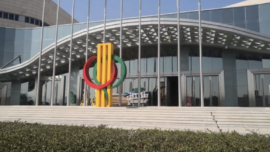They are cases in point in the city’s push for multulingual talents. Four local residents, proficient speakers of four key languages: Cantonese, Mandarin, Portuguese and English
MB February 2021 Special Report | One city, four ‘languages’

Calvin Chui, Lektou lawyer: “The language of my dreams switchEs channels”
Do you feel privileged to understand / speak the 4 languages?
Calvin Chui – It’s a privilege and an honour to be able to communicate in four languages.
In addition to your mother tongue (Cantonese), did you learn the others by taste or by professional need? Each of them has its own personal story or did things happen naturally?
C. C. – All came very naturally. Growing up in Macau, I first spoke Cantonese and picked up Mandarin later. Going to high school in the U.S., I got fluent in English. Studying in an undergraduate program in law in Portugal, I learned Portuguese.
Do you think in Cantonese (you dream in Cantonese …) and the other languages are only instruments of communication?
C. C. – Depending on my geographical location and the current events, the language of my dreams switch channels. That is, if I’m in Macau, I tend to think and dream in Cantonese. But if I have a Portuguese law exam in Macau, then usually the nightmares are in Portuguese.
Do you happen to be confused by the coexistence in Macau (and in your head…) of the four ways of expressing yourself? Can you give some examples, if it is the case?
C. C. –I happen to be both confused and delighted. Sometimes confused, when I have to switch channels in a multilingual setting. Delighted when I could play with the sounds of words in different languages.
Emil Marques, senior lecturer, University of Saint Joseph: “I do feel privileged and lucky to be able to understand the various points of view”

Do you feel privileged to understand / speak the 4 languages?
E. M. – To be able to converse in the language of different cultures provides insight and understanding beyond the lens of a foreigner. In this sense, being able to converse deeply in values and understanding within the different contexts and being accepted into circles of conversations, I do feel privileged and lucky to be able to understand the various points of view.
In addition to your mother tongue (Cantonese?), did you learn the others by taste or by professional need? Each of them has its own personal story or did things happen naturally?
E. M. – My mother tongue was Cantonese, which was taught through my mother and followed closely with Portuguese spoken by my father and his relatives. English was brought into the picture in formal schooling with Mandarin being introduced partly through high school and then later after university graduation where I took an intensive course in Mandarin. Since I went to school abroad, English was the language of schooling, therefore, Cantonese and English were not a choice but a need for everyday life. The informal Portuguese spoken was only done during family gatherings and odd occasions, formal training in Portuguese started in high school as an option and later at IPOR – Instituto Português do Oriente upon my return to Macau after I joined the Public Administration in 2001.
In terms of Mandarin, it was a thirst for knowledge of the Chinese culture, which I think is not reinforced enough during my schooling. This is obvious because almost half of my schooling was done overseas, so the question of “Who am I?” was a big question for me when I came back from my studies overseas. This inevitably led me to my Mandarin training which took me to the heart of China, its capital Beijing for almost 12 months.
Do you think Cantonese (you dream in Cantonese …) and the other languages are only instruments of communication?
E. M. – There is a magic that happens when you speak with someone in their mother tongue. This conveys cultural sensitivity, respect and genuine care. Taking time to learn a language means taking time to see what each culture has to offer, understand its history and show you’re being humble to become a student. These aspects of language are not immediately realized but are important parts of cultural exchange and language learning. There is no greater barrier to understanding than the unknown, and taking time to explore the cultural differences and similarities through language acquisition will break barriers of stereotypes and bring out real understanding and achieve harmony through respect and peaceful coexistence.
Do you happen to be confused by the coexistence in Macau (and in your head…) of the four ways of expressing yourself? Can you give some examples, if it is the case?
E. M. – The languages that coexist within me only compliments the situations that I am presented to. Some words that cannot be readily translated can be complemented with words from that specific culture for the full appreciation of meaning. Words related to virtues such as loyalty and devotion in Chinese will probably get you into trouble when you try to translate them into English or Portuguese. However, one word that has always eluded me is the word 義氣, which is similar to loyalty, but then you have the word 忠誠 for loyalty. If you were to ask this to a Chinese speaker, he will always tell you that it’s more than loyalty. Then again, this is the wonder of culture and languages.
André Ritchie, architect, STDM Property & Works Department: “Like most Macanese, my brain switches automatically to the most suitable language on a given occasion”

Do you feel privileged to understand/speak the 4 languages?
A.R. – Absolutely. A language is not only a communication tool, but a true representation of the cultural layers it originates from. In the current interconnected world that relies so much on English, access to other languages provide different perspectives to observe and understand how the world ticks. On the other hand, language skill is a powerful tool in business, especially when you happen to work in a multi-cultural environment like Macau and Hong Kong. Technical skills aside, it’s all about human interaction and chemistry.
In addition to your mother tongue, did you learn the others by taste or by professional need? Each of them has its own personal story, or did things happen naturally?
A.R. – I’m fluent in Portuguese, Cantonese, English and Italian. These languages basically represent the path of my life. We spoke Portuguese at home – so it’s my mother tongue. However, together with my brother, I was raised by a Chinese domestic helper. When mom and dad were out working, we would switch to Cantonese. My Cantonese skills were not sophisticated at the time though – just good enough to watch TV shows and basic interaction.
After spending some time in Portugal, I returned to Macau in 2003. That’s when I realised my Cantonese skills were poor and I had to be better equipped to succeed. I started listening to Cantonese radio shows while commuting to work, and I watched the news in Cantonese every evening to enhance my vocabulary. I had a translator in the office. I’d write down some expressions in Portuguese and ask him how to say it in Cantonese so that I could be more articulate. To this day, I still thank him for this. Later on in my career, it allowed me to tackle the press and legislators with no fear. In short, Cantonese is a mother tongue for me now. English I learned in school, but fluency came only in my teenage years while interacting with my non-Portuguese friends: mostly Americans, Australians and Filipinos.
I first attended Pǔtōnghuà classes in Portugal. I can speak and understand basic Pǔtōnghuà, but I’m not really fluent. While I’m a big fan of Cantonese and the pop culture and identity it embodies, I am in no way a localist. I’m perfectly aware of the importance of Pǔtōnghuà, to the point I somehow feel it’s my duty to be better at it. So, shame on me.
(Lastly, Italian. I lived in Naples for a year as an exchange student.)
Do you think/dream… in one of those four languages, I guess, but the other languages are only instruments of communication?
A.R. – In Italy I had a half-Austrian, half-Greek friend with whom I discussed topics related to our mixed identities. I remember asking her this very same question. She replied that her dreams and thinking were abstract, never knowing what language was involved. That would be my reply as well.
Do you happen to be confused by the coexistence in Macau (and in your head…) of the four ways of expressing yourself? Can you give some examples, if that is the case?
A.R. – It’s not confusing, it’s been like this since my childhood growing up in Macau. Therefore, like most Macanese, my brain switches automatically to the most suitable language on a given occasion. It’s a seamless operation. Take numbers as an example: I memorize phone numbers in Cantonese rather than in Portuguese because it’s just easier, whatever the reason.
Having said that, depending on the topic, I can better express myself using a certain language. Cantonese is very efficient, whereas Portuguese sometimes feels cumbersome. English would be the in-between. For this reason, when speaking to some people who are multi-lingual, it’s not uncommon for me to mix words and expressions from different languages in the same sentence. As a result of the traditional education values I was exposed to, I used to think of this as not an elegant way to express myself. But nowadays I see it differently; it’s about the most accurate and efficient way to convey my ideas, and mixing languages is also my way to celebrate our mixed cultural heritage.

Katrina Ip, lawyer at MDME: “incredibly privileged”
Do you feel privileged to understand/speak the 4 languages?
Katrina Ip – I feel incredibly privileged to be able to communicate in 4 different languages. Each language represents a distinct culture and is, in my opinion, the best vehicle for people to engage, learn and share with each other.
In addition to your mother tongue (Cantonese), did you learn the others by personal choice or by professional need? Does each of them have its own personal story, or did things happen naturally?
K.I – Growing up, my parents were supportive and actively encouraged my interest in other languages. I attended after school language classes and holiday camps through most of my secondary schooling years. I found these enjoyable and over the years developed an appreciation for languages beyond much more than just characters and words; they are the embodiment of history, culture and traditions of a certain group of people. I studied in Beijing, Lisbon and New York coming back to Macau to practice law. It was challenging every time I moved to a new country that spoke a totally different language. After a period of adaptation and settling in, learning the language became quite natural. I speak Cantonese, Mandarin, English and Portuguese every day at work. I have found it to be much more efficient communicating to people in their native language.
Do you think in Cantonese (you dream in Cantonese …) and the other languages are only instruments of communication?
K.I – I find it difficult to speak or write in a language that is different to the one I am thinking in my mind. My mindset and manner of speaking vary depending on the language. I did not notice this at first but now find this to be quite amusing.
Do you happen to be confused by the coexistence in Macau (and in your head…) of the four ways of expressing yourself? Can you give some examples, if that is the case?
K.I. – I do occasionally confuse the languages by randomly adding in some words from a language that is different to the one I am speaking in. Most often this happens when I refer to something that does not coexist in another culture or language. Many people speak multiple languages. I frequently find myself blending languages together when I know the person I am speaking to can also understand both languages.
























